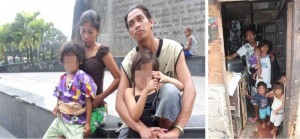“Mahirap tumira sa lansangan. Maingay, magulo. Hindi ka makakain at makatulog ng maayos. Sana balang araw makaalis kami sa ganitong sitwasyon (It’s hard to live in the streets. It’s noisy and dirty here. You can’t eat and sleep well. We hope that we’ll be able to get out of this situation someday).”
This is how Mark Anthony Simpson describes his life living in the streets of Manila.
He is one of the participants of the Department of Social Welfare and Development’s (DSWD) six-day Family Camp. The activity was an opportunity for 100 street families, majority of who belong to the Modified Conditional Cash Transfer Program for Homeless Street Families (MCCT-HSF).
MCCT-HSF provides a complete package of assistance to street families, including responsive shelter programs, with access to social services, and economic opportunities for the improvement of their living conditions. It also extends house rental assistance of up to P4,000 per month for six months to one year.
Bonding
Mark, 24, avers that the Family Camp of the Department is a good chance for families to bond. He and his wife Karmi work as barkers in Ermita thus they do not have the time and means to spend time and have fun with their kids.
“Kapag po kasi nasa kalye ka puro hanap-buhay ang iniisip mo. Kaya sumasama kami sa Family Camp ng DSWD para makapagsama-sama kami at maging masaya ng pamilya ko (You always think about work when you’re in the streets. My family joined the Family Camp of DSWD so we could be together and enjoy),” said the father of three.
It was unforgettable for Mark.
Asked what his most memorable experience in the camp was, he said it was spending time with his family in a bedroom with clean beddings and a comfort room.
“’Yung sama-sama kami sa isang kuwarto, nakakakain kami ng maayos, di ko malilimutan ‘yun (The experience of being together with my family in one room, eating good food, sleeping with clean beddings and having a comfort room is something I will never forget),” he added.
Karmi recalled the activities prepared for the families.
There were story-telling sessions and film viewing and lectures on cleanliness and personal hygiene, children’s rights, and values education. Discussions and workshops on parenting and family planning were also conducted for the parents.
“Tinuruan kami tungkol sa family planning, paano alagaan ang pamilya namin at palakihin ng tama ang mga anak (We were taught about family planning and how to rear our children the right way),” Karmi said.
“Marami pong gawain para sa pamilya. May mga games at swimming pa. Enjoy na enjoy ang mga bata (There were a lot of activities for the families. There were games and we went swimming. The kids really enjoyed),” Karmi added.
Hope
The Family Camp gives hope to street families and makes them realize that help is available.
It is a regular activity of MCCT-HSF and Comprehensive Program for Street Children and Street Families, including the Indigenous Peoples (IP). Since 2011, the camp has been a venue for the local government units to discuss with the street families their concerns and the government support interventions and services for them.
“May tumutulong sa amin – ang DSWD. Kaya tinatanggap namin [ang tulong] kasi napapabuti naman kami. Nakasali pa kami sa cash-for-work kaya may napagkakakitaan kami (We are getting help, it is from the DSWD. We receive their help because we believe they are doing it to make us improve. We even joined the cash-for-work and thus, we have additional source of income),” Mark related.
He became a beneficiary DSWD’s cash-for-work program after the camp. He was a street sweeper in Luneta and earned P320 per day, for 10 days.
The DSWD’s cash-for-work is an intervention that provides temporary employment to distressed or displaced individuals.
Like Mark, Joel Dela Cruz and his family also availed the assistance offered in the camp.
The 33-year-old father of four became a street sweeper through the cash-for-work program.
Joel related, “Masaya kami roon [sa camp]. Masayang nagkakainan, nag-uusap. May mga activity para sa mga bata at matanda. Tinuruan kami kung paano namin mabibigyan ng magandang buhay ang mga anak namin (We were happy there. We were eating together, just talking. There were activities for the children and adults. We were taught how to make better lives for our kids).”###
– See more at: https://www.dswd.gov.ph/2015/02/street-families-dream-of-change-2/#sthash.Rs6ViH4P.dpuf


